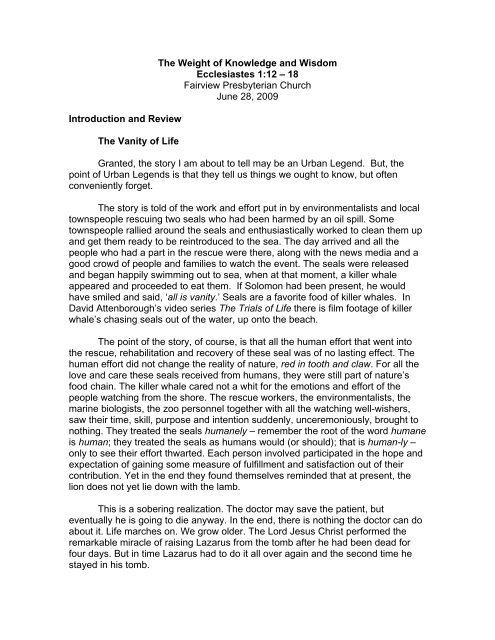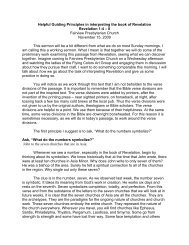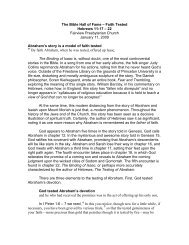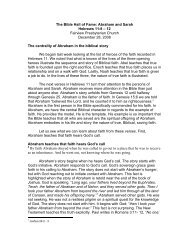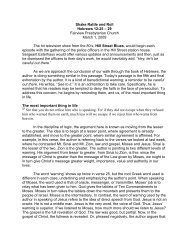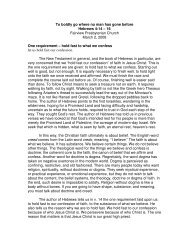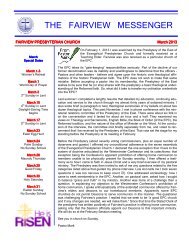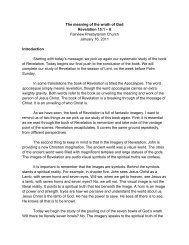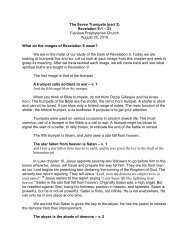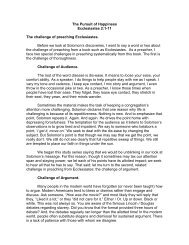The Weight of Knowledge and Wisdom Ecclesiastes 1:12 – 18 ...
The Weight of Knowledge and Wisdom Ecclesiastes 1:12 – 18 ...
The Weight of Knowledge and Wisdom Ecclesiastes 1:12 – 18 ...
You also want an ePaper? Increase the reach of your titles
YUMPU automatically turns print PDFs into web optimized ePapers that Google loves.
Introduction <strong>and</strong> Review<br />
<strong>The</strong> Vanity <strong>of</strong> Life<br />
<strong>The</strong> <strong>Weight</strong> <strong>of</strong> <strong>Knowledge</strong> <strong>and</strong> <strong>Wisdom</strong><br />
<strong>Ecclesiastes</strong> 1:<strong>12</strong> <strong>–</strong> <strong>18</strong><br />
Fairview Presbyterian Church<br />
June 28, 2009<br />
Granted, the story I am about to tell may be an Urban Legend. But, the<br />
point <strong>of</strong> Urban Legends is that they tell us things we ought to know, but <strong>of</strong>ten<br />
conveniently forget.<br />
<strong>The</strong> story is told <strong>of</strong> the work <strong>and</strong> effort put in by environmentalists <strong>and</strong> local<br />
townspeople rescuing two seals who had been harmed by an oil spill. Some<br />
townspeople rallied around the seals <strong>and</strong> enthusiastically worked to clean them up<br />
<strong>and</strong> get them ready to be reintroduced to the sea. <strong>The</strong> day arrived <strong>and</strong> all the<br />
people who had a part in the rescue were there, along with the news media <strong>and</strong> a<br />
good crowd <strong>of</strong> people <strong>and</strong> families to watch the event. <strong>The</strong> seals were released<br />
<strong>and</strong> began happily swimming out to sea, when at that moment, a killer whale<br />
appeared <strong>and</strong> proceeded to eat them. If Solomon had been present, he would<br />
have smiled <strong>and</strong> said, ‘all is vanity.’ Seals are a favorite food <strong>of</strong> killer whales. In<br />
David Attenborough’s video series <strong>The</strong> Trials <strong>of</strong> Life there is film footage <strong>of</strong> killer<br />
whale’s chasing seals out <strong>of</strong> the water, up onto the beach.<br />
<strong>The</strong> point <strong>of</strong> the story, <strong>of</strong> course, is that all the human effort that went into<br />
the rescue, rehabilitation <strong>and</strong> recovery <strong>of</strong> these seal was <strong>of</strong> no lasting effect. <strong>The</strong><br />
human effort did not change the reality <strong>of</strong> nature, red in tooth <strong>and</strong> claw. For all the<br />
love <strong>and</strong> care these seals received from humans, they were still part <strong>of</strong> nature’s<br />
food chain. <strong>The</strong> killer whale cared not a whit for the emotions <strong>and</strong> effort <strong>of</strong> the<br />
people watching from the shore. <strong>The</strong> rescue workers, the environmentalists, the<br />
marine biologists, the zoo personnel together with all the watching well-wishers,<br />
saw their time, skill, purpose <strong>and</strong> intention suddenly, unceremoniously, brought to<br />
nothing. <strong>The</strong>y treated the seals humanely <strong>–</strong> remember the root <strong>of</strong> the word humane<br />
is human; they treated the seals as humans would (or should); that is human-ly <strong>–</strong><br />
only to see their effort thwarted. Each person involved participated in the hope <strong>and</strong><br />
expectation <strong>of</strong> gaining some measure <strong>of</strong> fulfillment <strong>and</strong> satisfaction out <strong>of</strong> their<br />
contribution. Yet in the end they found themselves reminded that at present, the<br />
lion does not yet lie down with the lamb.<br />
This is a sobering realization. <strong>The</strong> doctor may save the patient, but<br />
eventually he is going to die anyway. In the end, there is nothing the doctor can do<br />
about it. Life marches on. We grow older. <strong>The</strong> Lord Jesus Christ performed the<br />
remarkable miracle <strong>of</strong> raising Lazarus from the tomb after he had been dead for<br />
four days. But in time Lazarus had to do it all over again <strong>and</strong> the second time he<br />
stayed in his tomb.
<strong>The</strong>se conundrums <strong>of</strong> life raise important issues. <strong>The</strong>y put Solomon on his<br />
quest. This is the question Solomon is seeking to answer in the book <strong>of</strong><br />
<strong>Ecclesiastes</strong>. Where is satisfaction <strong>and</strong> fulfillment found in life? In the opening<br />
verses <strong>of</strong> chapter one Solomon concluded that contentment is not found in life in<br />
human labor, or in nature, or in the search for that which is new <strong>and</strong> exciting. In the<br />
remaining verses <strong>of</strong> chapter one Solomon explores whether or not fulfillment <strong>and</strong><br />
satisfaction can be found in wisdom <strong>and</strong> knowledge.<br />
In Shakespeare’s play Henry V, Henry says <strong>of</strong> himself at one point, If it be a<br />
sin to covet honor, I am the most <strong>of</strong>fending soul. King Henry wanted honor. King<br />
Solomon wanted wisdom.<br />
<strong>The</strong> Vanity <strong>of</strong> <strong>Knowledge</strong><br />
<strong>12</strong> I, the Preacher, was king over Israel in Jerusalem.<br />
16 I communed with my heart, saying, “Look, I have attained greatness, <strong>and</strong><br />
have gained more wisdom than all who were before me in Jerusalem. My<br />
heart has understood great wisdom <strong>and</strong> knowledge.”<br />
Solomon was a wise <strong>and</strong> learned man. He was a polymath, knowledgeable<br />
about law, theology, economics, astronomy, nature, sea travel, military, farming,<br />
architecture, mechanics <strong>and</strong> more. He made the commitment to pursue knowledge<br />
<strong>and</strong> underst<strong>and</strong>ing. He wanted to know, how far along the road <strong>of</strong> contentment will<br />
wisdom take me?<br />
Solomon could embark upon this project because he was at the top <strong>of</strong> the<br />
world. He was king in Jerusalem. He was wealthy <strong>and</strong> successful. He could give<br />
himself over wholly to the pursuit <strong>of</strong> wisdom <strong>and</strong> knowledge because he did not<br />
need to worry about making ends meet <strong>and</strong> making a living. He had already<br />
determined that human labor could not be a source <strong>of</strong> personal fulfillment, but what<br />
about being a man <strong>of</strong> learning <strong>and</strong> underst<strong>and</strong>ing? Perhaps the secret would be<br />
found in the life <strong>of</strong> the mind, in being able to underst<strong>and</strong> <strong>and</strong> comprehend the world<br />
about us. He had available to him significant resources enabling him to pursue this<br />
quest. He had great wisdom as a gift from God <strong>and</strong> he applied himself to learn<br />
more. A king’s court attracts the brightest <strong>and</strong> best. He could tap into the learning<br />
<strong>and</strong> knowledge <strong>of</strong> others. <strong>The</strong> goal <strong>of</strong> learning is to surpass your teacher. Solomon<br />
ran farther than all others who had come before him in Jerusalem.<br />
Before we look at the results <strong>of</strong> Solomon’s inquiry regarding the power <strong>of</strong><br />
wisdom to bring contentment, I need to make a few preliminary observations.<br />
Preliminary Observations<br />
13 And I set my heart to seek <strong>and</strong> search out by wisdom concerning all that is done<br />
under heaven;<br />
<strong>Wisdom</strong> is a good thing
<strong>The</strong> first observation is this: that wisdom is a good thing. We will look at it in<br />
greater detail in a few moments, but for now, as you know from the scripture<br />
reading, Solomon concludes that fulfillment <strong>and</strong> satisfaction in life will not be found<br />
solely in wisdom alone. Having concluded thus, it is important not to then jump to<br />
an erroneous conclusion that therefore wisdom, knowledge, <strong>and</strong> education is <strong>of</strong> no<br />
value. Solomon is not the Hebrew version <strong>of</strong> Tom Sawyer, always looking for an<br />
excuse to get out <strong>of</strong> the expectations <strong>and</strong> requirements <strong>of</strong> his schooling. <strong>Wisdom</strong><br />
<strong>and</strong> knowledge are great vehicles <strong>of</strong> blessing in our lives. <strong>Knowledge</strong> <strong>and</strong> wisdom<br />
give to us power, insight, personal benefit, entertainment, underst<strong>and</strong>ing, sympathy<br />
<strong>and</strong> more. <strong>The</strong>se are good things. Solomon is not opposing them per se. He is not<br />
rejecting wisdom, knowledge, underst<strong>and</strong>ing <strong>and</strong> learning. He is saying only that,<br />
they are not, finally, a source for contentment in life.<br />
This leads to the second observation that wisdom has its proper place in life.<br />
<strong>Wisdom</strong> has its place<br />
Grasping wisdom <strong>and</strong> knowledge is a way in which the discoveries <strong>and</strong><br />
advances <strong>of</strong> previous generations are passed on to us in life. We do not need to<br />
reinvent with each generation the Pythagorean <strong>The</strong>orem, or how to mix concrete,<br />
or how to prevent Yellow Fever because these discoveries, <strong>and</strong> so much more,<br />
have been articulated, retained <strong>and</strong> passed on to us. We can take things further.<br />
We can exp<strong>and</strong> the horizon or push the outer limits <strong>of</strong> the envelope. And, we do<br />
not have to make the same mistakes again. We can avoid pitfalls <strong>of</strong> the past.<br />
Thankfully, wisdom <strong>and</strong> knowledge are transferable from one generation to<br />
the next. A major task <strong>of</strong> parenting is to train our children to take their place in<br />
honorable adulthood. Doing so involves more than training them in marketable<br />
skills or teaching them how to balance their checkbook. Parents are tasked with<br />
the job <strong>of</strong> instructing children in spiritual truth, giving to them wisdom <strong>and</strong><br />
underst<strong>and</strong>ing; encouraging <strong>and</strong> guiding them in living a life <strong>of</strong> honesty <strong>and</strong> virtue.<br />
A parent’s job is to take the wisdom God has entrusted to them <strong>and</strong> seek to pass it<br />
on to their children.<br />
With these two observations in mind, that wisdom is a good thing <strong>and</strong> that<br />
wisdom has its place in life, the third observation flows from them: that it is folly to<br />
ask more <strong>of</strong> wisdom than it can give.<br />
It is Folly (Vanity) to ask more <strong>of</strong> <strong>Wisdom</strong> than it can give<br />
One <strong>of</strong> my favorite stories is about the pastor who quit being a pastor in<br />
order to become an undertaker. Some time after the career change was complete;<br />
a former parishioner <strong>of</strong> the pastor-now-turned-mortician came to visit. He asked<br />
him, why did you change? <strong>The</strong> pastor-now-turned-mortician sighed <strong>and</strong> replied.<br />
You have to underst<strong>and</strong>, being a pastor was so frustrating. People would come to<br />
me for counseling <strong>and</strong> advice <strong>and</strong> I would pour out my heart for them. I would pray<br />
for them, guide them, advise them only to find that all my efforts did not work. Six
months later their lives would be falling apart again. Being a mortician is much<br />
better. Now, when I straighten them out, they stay straight.<br />
<strong>Knowledge</strong> <strong>and</strong> wisdom provide good in life, but not ultimate good. <strong>Wisdom</strong><br />
<strong>and</strong> education are not panaceas. <strong>The</strong>y will not solve all problems. Solomon was<br />
one <strong>of</strong> the wisest men to ever live, yet he nonetheless ended his life in shame <strong>and</strong><br />
failure. His wisdom alone was not enough. <strong>The</strong>re are many in our world,<br />
particularly educators, politicians, <strong>and</strong> journalists, who expect too much <strong>of</strong><br />
education <strong>and</strong> knowledge. <strong>The</strong>y mistakenly presume that every problem in society<br />
<strong>and</strong> culture can be corrected <strong>and</strong> solved through an educational program <strong>of</strong> some<br />
sort. <strong>Wisdom</strong> is valuable, but it has its limits. It is foolish to expect more <strong>of</strong> it than it<br />
can deliver.<br />
<strong>The</strong> fourth observation is this: gaining wisdom takes work.<br />
Gaining <strong>Wisdom</strong> Takes Work<br />
this burdensome task God has given to the sons <strong>of</strong> man, by which they may<br />
be exercised.<br />
Gaining wisdom does not come naturally. We have to work at it. We have to<br />
do as the book <strong>of</strong> James instructs us, to pray <strong>and</strong> ask God to give us wisdom.<br />
When Adam <strong>and</strong> Eve disobeyed God they ate from the tree <strong>of</strong> knowledge. Part <strong>of</strong><br />
their desire was to gain knowledge as God knew it. In the punishment given them<br />
by God, Adam was told that the ground would yield its fruit only by the sweat <strong>of</strong> his<br />
brow. Growing food would be accomplished only with hard work <strong>and</strong> difficulty. It<br />
would not come easily. <strong>The</strong> same is true for the pursuit <strong>of</strong> wisdom. <strong>The</strong> tree <strong>of</strong><br />
knowledge only yields its fruit to those who work at it <strong>and</strong> pursue it diligently.<br />
Solomon describes the effort as toilsome <strong>and</strong> wearying: it is both physically <strong>and</strong><br />
mentally tiring.<br />
So, with these four observations as background, let us look closely at<br />
Solomon’s discoveries.<br />
Solomon’s Insight: He Reminds Us What <strong>Wisdom</strong> Cannot Do<br />
Solomon’s argument is by induction. Essentially he is saying, ‘I’ve tried it all<br />
<strong>and</strong> it doesn’t work.’ If contentment <strong>and</strong> satisfaction could be obtained through<br />
wisdom, he would have found it. But he did not. He came to some conclusions as<br />
to why wisdom cannot finally bring fulfillment to life.<br />
sin.<br />
First, he determined that wisdom cannot solve humanity’s greatest problem:<br />
<strong>Wisdom</strong> Cannot Solve Humanity’s Greatest Problem <strong>–</strong> Sin<br />
15 What is crooked cannot be made straight,
Early in the previous century a newspaper in London sponsored a series <strong>of</strong><br />
articles in which they invited various people to address the question: ‘What is<br />
wrong with the world?’ People put forward a variety <strong>of</strong> thoughtful explanations <strong>and</strong><br />
commentary on the source <strong>of</strong> the woes <strong>and</strong> trouble <strong>of</strong> our world. <strong>The</strong> articles<br />
generated a great deal <strong>of</strong> debate <strong>and</strong> discussion. <strong>The</strong> Christian journalist G. K.<br />
Chesterton gave the most astute <strong>and</strong> accurate answer to the question. He wrote,<br />
Dear Sir, you ask, ‘what is wrong with the world?’ I am. Yours most sincerely, G. K.<br />
Chesterton.<br />
Chesterton understood that the problem <strong>of</strong> the world is not finally the<br />
division between the nations, but the division <strong>of</strong> the human heart. <strong>The</strong> line <strong>of</strong> good<br />
<strong>and</strong> evil runs through the heart. You cannot educate away sin. You cannot tutor a<br />
man into righteousness. This is the limit <strong>of</strong> learning. You can make smarter<br />
sinners, but they are still sinners. <strong>Wisdom</strong> <strong>and</strong> education do not change our human<br />
nature or temperament. As Solomon says, what is crooked cannot be made<br />
straight by the power <strong>of</strong> wisdom. This truth is portrayed in literature through the<br />
character type <strong>of</strong> the brilliant villain, a Dr. Moriarity or Hannibal Lector, men who<br />
have great insight <strong>and</strong> underst<strong>and</strong>ing, but use their wisdom for criminal ends. We<br />
do not need fiction to illustrate the truth <strong>of</strong> Solomon’s discovery. <strong>The</strong> tyrants <strong>of</strong> the<br />
20 th century were educated tyrants. Prior to World War II the people <strong>of</strong> Germany<br />
were among the most educated <strong>and</strong> sophisticated population on earth. Many who<br />
serve the cause <strong>of</strong> terrorism today are highly trained <strong>and</strong> educated, <strong>of</strong>ten as<br />
doctors. <strong>Wisdom</strong> is incapable <strong>of</strong> dealing with human sinfulness.<br />
This is the first limitation on wisdom Solomon articulates. <strong>The</strong> second is that<br />
wisdom cannot make a perfect world.<br />
<strong>Wisdom</strong> Cannot Make a Perfect World<br />
And what is lacking cannot be numbered.<br />
In the modern world, successful nations achieve their success in part by<br />
dividing their world into three spheres: 1) business <strong>and</strong> trade, 2) government <strong>and</strong><br />
politics, <strong>and</strong> 3) religion <strong>and</strong> morality. <strong>The</strong> three spheres are distinct <strong>and</strong> separated,<br />
but they also meet <strong>and</strong> overlap in the middle. <strong>The</strong>re is dialog <strong>and</strong> exchange taking<br />
place between them. Religious faith provides moral guidance to business <strong>and</strong><br />
political legislation. Politics looks out for the common good <strong>and</strong> acts a mediator in<br />
societal debate. Business provides a means to harness people’s natural initiative,<br />
enabling people to turn labor into pr<strong>of</strong>it <strong>and</strong> create wealth.<br />
Much that is positive <strong>and</strong> good has been accomplished in the modern world.<br />
<strong>The</strong>re has been much improvement in the spread <strong>of</strong> liberty, health care, longevity,<br />
material wealth, <strong>and</strong> economic opportunity, the near eradication <strong>of</strong> slavery, the<br />
increase in literacy, <strong>and</strong> more. <strong>The</strong>re is much to be done, but much has been done.<br />
Probably every person in this sanctuary today has lived <strong>and</strong> will live a longer,<br />
healthier, <strong>and</strong> more prosperous life than kings <strong>and</strong> queens did in the middle ages.<br />
<strong>The</strong> world has come a long way.
That said, Solomon would add that while progress is real, progress in this<br />
life will never be complete or final. What is lacking cannot be numbered is the way<br />
he puts it. We cannot perfect the world through our efforts. We will not usher in the<br />
kingdom <strong>of</strong> God as the fruit <strong>of</strong> our accomplishments. <strong>Wisdom</strong> is not the pathway to<br />
a utopia. Corruption will always set in. Decay will always threaten to return. It is<br />
always there, crouching at the door. Perfectibility is not a possibility for the human<br />
mind remains vulnerable to corruption, crooked <strong>and</strong> perverse. I once read the<br />
report <strong>of</strong> a woman whose husb<strong>and</strong> was a pr<strong>of</strong>essor at a well known university.<br />
Someone asked her what her husb<strong>and</strong> did. She replied that he spent his days<br />
thinking <strong>of</strong> learned reasons to help people justify doing what they know they should<br />
not do.<br />
<strong>The</strong> first limitation Solomon discovers is that wisdom cannot deal with<br />
human sin. <strong>The</strong> second is that wisdom cannot make a perfect world. <strong>The</strong> third is<br />
that in the end, ironically, wisdom itself cannot be finally grasped.<br />
In the end, <strong>Wisdom</strong> cannot be finally Grasped<br />
14 I have seen all the works that are done under the sun; <strong>and</strong> indeed, all is<br />
vanity <strong>and</strong> grasping for the wind.<br />
17 And I set my heart to know wisdom <strong>and</strong> to know madness <strong>and</strong> folly. I<br />
perceived that this also is grasping for the wind. For in much wisdom is<br />
much grief,<br />
<strong>The</strong> proverb is true: the more you learn, the more you know how little you<br />
know. You begin to embark upon a study <strong>of</strong> field <strong>of</strong> knowledge <strong>and</strong> discover quickly<br />
that there is a lot more there than you first thought or anticipated. I think C. S.<br />
Lewis capture this phenomenon well when he wrote <strong>of</strong> some things being bigger<br />
on the inside than they are on the outside. From the outside they appear<br />
graspable, manageable, <strong>and</strong> capable <strong>of</strong> being mastered. But from the inside, we<br />
find that we have entered into a new <strong>and</strong> endless world. <strong>The</strong> more we know, the<br />
more we see how vast things are.<br />
<strong>The</strong> truth <strong>of</strong> this is seen in the way in which different fields <strong>of</strong> knowledge<br />
tend to develop their own vocabulary. Doctors, dentists, computer programmers,<br />
theologians, chefs, sailors, butchers, lawyers all have their distinct language <strong>and</strong><br />
way <strong>of</strong> talking. I once listened to the CEO <strong>of</strong> a mobile phone company describing<br />
what was new in his business <strong>and</strong> when he was done I had no idea what he had<br />
said. Here was a world entirely foreign to me. He was speaking English, but I could<br />
not grasp what he meant.<br />
Solomon discovered this limitation <strong>of</strong> wisdom. It can never grasp all there is<br />
to know. I can put some effort <strong>and</strong> time into learning the new products <strong>and</strong> services<br />
Qualcomm is <strong>of</strong>fering <strong>and</strong> in a short time I could grasp a sufficient amount <strong>of</strong><br />
information to underst<strong>and</strong> what the CEO meant. But there is still the world <strong>of</strong> all the<br />
technology that lies beneath it, that would be beyond me. I have spent my adult life<br />
learning the vocabulary <strong>and</strong> underst<strong>and</strong>ing <strong>of</strong> a single sphere <strong>of</strong> knowledge:
theology. But it is only one <strong>of</strong> hundreds <strong>of</strong> spheres, each with its own language,<br />
framework, discoveries, <strong>and</strong> accomplishments.<br />
Solomon found the limitation <strong>of</strong> wisdom to deal with human sinfulness. He<br />
found that it could not accomplish human perfectibility. He realized that even in the<br />
greatest effort complete wisdom is well beyond our grasp. Finally, Solomon<br />
discerned that wisdom cannot erase the reality <strong>of</strong> past mistakes <strong>and</strong><br />
misunderst<strong>and</strong>ing.<br />
<strong>Wisdom</strong> Cannot Erase the Reality <strong>of</strong> Past Mistakes <strong>and</strong><br />
Misunderst<strong>and</strong>ing<br />
<strong>18</strong> For in much wisdom is much grief, And he who increases knowledge<br />
increases sorrow.<br />
One <strong>of</strong> the sad ironies <strong>of</strong> the pursuit <strong>of</strong> wisdom is that as we gain it, we <strong>of</strong>ten<br />
discover past mistakes <strong>and</strong> misunderst<strong>and</strong>ings. <strong>The</strong>re is a certain creative self<br />
destruction involved in gaining wisdom. <strong>The</strong> more we learn, the more we discover<br />
past mistakes. <strong>The</strong> more we know the more we see our errors. I think back upon<br />
some <strong>of</strong> the sermons I have preached in previous churches <strong>and</strong> I want to go back<br />
<strong>and</strong> apologize: if I only knew then what I know now…<br />
Solomon understood that wisdom can bring grief. An increase in knowledge<br />
can increase our sorrow. We all know the experience <strong>of</strong> looking back upon our life<br />
realizing that actions <strong>and</strong> decisions that we took with confidence at the time have<br />
since proven foolish <strong>and</strong> false in the passing <strong>of</strong> time. Most <strong>of</strong> the time there is<br />
nothing that can be done when such realizations occur. As the poet Emily<br />
Dickenson puts it<br />
My Triumph lasted till the Drums<br />
Had left the Dead alone<br />
And then I dropped my Victory<br />
And chastened stole along<br />
To where the finished Faces<br />
Conclusion turned on me<br />
And then I hated Glory<br />
And wished myself were <strong>The</strong>y.<br />
What is to be is best descried<br />
When it has also been --<br />
Could Prospect taste <strong>of</strong> Retrospect<br />
<strong>The</strong> tyrannies <strong>of</strong> Men<br />
Were Tenderer -- diviner<br />
<strong>The</strong> Transitive toward.<br />
A Bayonet's contrition<br />
Is nothing to the Dead.
In this poem the victor regrets the cost <strong>of</strong> victory. <strong>Wisdom</strong> has brought a change in<br />
perspective. When we consider the sweep <strong>of</strong> human history <strong>and</strong> consider the<br />
prevalence <strong>of</strong> injustice, sorrow <strong>and</strong> tragedy we underst<strong>and</strong> why the Greek<br />
philosopher Heraclitus would look upon all the world with weeping eyes.<br />
Gaining wisdom as one matures in life brings with it new discoveries. We<br />
discover our past mistakes <strong>and</strong> errors. We discover that some people, who have<br />
wisdom, choose not to use it. We see others jump up <strong>and</strong> down <strong>and</strong> call it<br />
progress. Still others are content in their folly <strong>and</strong> foolishness. Many people persist<br />
in patterns <strong>of</strong> life that are foolish or self destructive. We wonder to ourselves, why<br />
do they not see it?<br />
Close<br />
<strong>The</strong>se are Solomon’s four insights regarding wisdom. He sees the good <strong>of</strong><br />
wisdom, but also discovers its limitations. <strong>Wisdom</strong> brings value to life but its sphere<br />
is limited. <strong>Wisdom</strong> cannot deal with the reality <strong>of</strong> human sinfulness. <strong>Wisdom</strong> will<br />
not lead to utopia. It cannot usher in the Kingdom <strong>of</strong> God. In addition, Solomon<br />
learned that wisdom is, in a final sense, beyond us. <strong>The</strong> wisdom <strong>of</strong> God’s world is<br />
too great, <strong>and</strong> whatever wisdom we gain in life is always, ultimately, a small<br />
fraction <strong>of</strong> what there is to know. Finally, Solomon realized that growing in wisdom<br />
meant the reevaluation <strong>of</strong> the past. We discover the ways in which we have been<br />
wrong or foolish. <strong>Wisdom</strong> in this way brings with it grief <strong>and</strong> sorrow.<br />
Solomon lived during the Old Testament era. His words to us are part <strong>of</strong><br />
sacred scripture, inspired <strong>and</strong> God-breathed. But they are not the last word. <strong>The</strong><br />
dilemmas Solomon identified regarding the place <strong>of</strong> wisdom in human life are<br />
ultimately resolved through the work <strong>and</strong> ministry <strong>of</strong> Jesus Christ. Solomon saw<br />
that wisdom <strong>and</strong> knowledge could not deal with the reality <strong>of</strong> human sinfulness.<br />
Jesus Christ is the wisdom <strong>of</strong> God. His sacrifice is the perfect remedy, the payment<br />
for sin, making possible the reality <strong>of</strong> new life. Solomon recognized that wisdom<br />
could never perfect the world. Jesus Christ is building his kingdom. One day he will<br />
bring to fulfillment his new, perfect world. Solomon saw the limitations <strong>of</strong> wisdom,<br />
that all sufficient knowledge <strong>and</strong> underst<strong>and</strong>ing could not be grasped. At the same<br />
time, in Jesus Christ we see the ultimate wisdom <strong>of</strong> God. Jesus Christ is the sum<br />
<strong>and</strong> substance. He grasps it all. Finally, Solomon realized that wisdom could not<br />
erase past mistakes. Things done cannot be undone. Jesus Christ has the ability to<br />
redeem our sins <strong>and</strong> failings. God, through Christ, draws straight lines with crooked<br />
sticks. Through Jesus Christ even our past failings can find meaning <strong>and</strong><br />
redemption. And that is a comforting thought.<br />
Say 'Amen' Somebody


